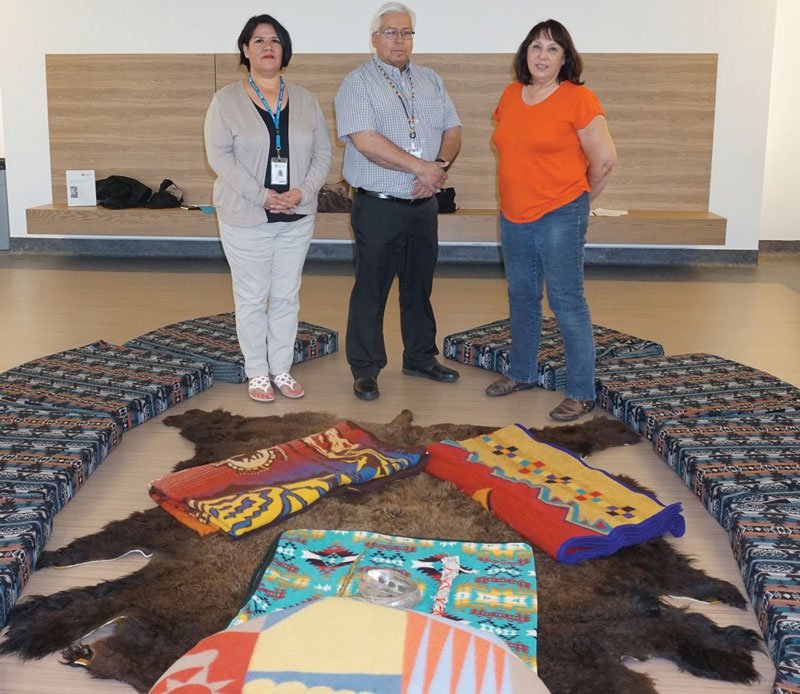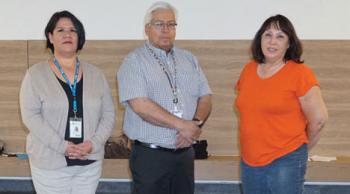Image Caption
By Shari Narine
Windspeaker.com Contributor
LETHBRIDGE, Alta.
A ceremony room that at the Chinook Regional Hospital in Lethbridge is helping Indigenous patients and their families in stressful times.
“The families that have used it have been very appreciative because as Indigenous people, we have large families. Especially when we’re dealing with some serious health issues, we have our families gather around us and provide that support. So it gives us the opportunity to have a room where there’s some privacy…
“It gives us that opportunity to have those ceremonies that burn a substance. Because (the room) is ventilated, we’re able to have those sacred ceremonies as needed,” said Harley Crowshoe, senior advisor with Indigenous Health in the south zone.
Last June, four Elders, two each from the Blood Tribe and the Piikani Nation, blessed the ceremony room, as well as the people who use it and the hospital staff. They gifted the room with a Blackfoot name, which translates to Golden Eagle Lodge.
“It’s a very sacred and precious name… Indigenous people, the eagle spirit protects us, watches over us and carries our prayers to the Creator. The eagle is very sacred to us, especially the golden eagle. To be given that name is very precious and sacred for that room,” said Crowshoe.
When the hospital was redeveloped at a cost of $135 million and a new five-storey wing added, Alberta Health Services saw the opportunity to meet one of the priorities–improved Indigenous health care–that had been identified over the years.
“The room is a partnership between spiritual care and Indigenous health program,” said Crowshoe, who explained that the chapel being used by the Spiritual Care Unit was old.
“I’m excited about the room. It’s a step in being able to provide those supports in a very respectful and real way,” he said.
Crowshoe points out that the Lethbridge hospital is used by the neighbouring Treaty 7 First Nations, including the Blood Tribe, which has one of the highest First Nation populations in Canada.
He also notes that Lethbridge is home to a large urban Indigenous population.
Also helping Indigenous patients and their families are two Indigenous hospital liaisons, whose split shifts cover seven days, including five evenings. Both liaisons have Blackfoot ancestry and some understanding of the language.
Crowshoe says he is in the process of filling a traditional wellness position, which will allow patients to receive traditional healing or wellness supports as needed.
Support for Indigenous patients is reaching farther than the Chinook Hospital . The Cardston hospital has an Indigenous hospital liaison.
“We’re working closely with that position, and that position as we move forward will be part of that Indigenous health program, more of a team approach,” said Crowshoe.
He adds they are looking for opportunities in which they can work more closely with Pincher Creek, Fort Macleod and Medicine Hat hospitals. Crowshoe says that he can see rooms similar to the Golden Eagle Lodge being developed in each hospital, all of which serve large Indigenous populations.
“We’ve always been there one way or another, but I think there’s that renewed focus and we’ve completed our Indigenous health action plan – that was completed and signed off last July – so as we move forward there’s certainly those priorities we need to work on and build.
The important thing is building the program so that it’s responsive to the needs of our Indigenous population, no matter what tribe they’re from,” said Crowshoe.
He adds that he is encouraged by the direction in which Alberta Health Services is moving.
“It’s an opportunity to deliver appropriate and healthfully safe health services to our Indigenous population,” he said.


